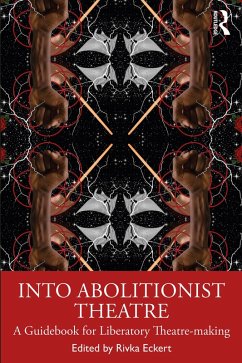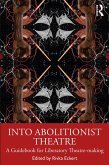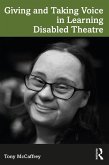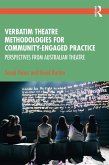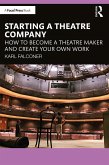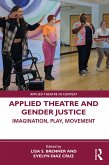Into Abolitionist Theatre (eBook, PDF)
A Guidebook for Liberatory Theatre-making
Redaktion: Eckert, Rivka
39,95 €
39,95 €
inkl. MwSt.
Sofort per Download lieferbar

20 °P sammeln
39,95 €
Als Download kaufen

39,95 €
inkl. MwSt.
Sofort per Download lieferbar

20 °P sammeln
Jetzt verschenken
Alle Infos zum eBook verschenken
39,95 €
inkl. MwSt.
Sofort per Download lieferbar
Alle Infos zum eBook verschenken

20 °P sammeln
Into Abolitionist Theatre (eBook, PDF)
A Guidebook for Liberatory Theatre-making
Redaktion: Eckert, Rivka
- Format: PDF
- Merkliste
- Auf die Merkliste
- Bewerten Bewerten
- Teilen
- Produkt teilen
- Produkterinnerung
- Produkterinnerung

Bitte loggen Sie sich zunächst in Ihr Kundenkonto ein oder registrieren Sie sich bei
bücher.de, um das eBook-Abo tolino select nutzen zu können.
Hier können Sie sich einloggen
Hier können Sie sich einloggen
Sie sind bereits eingeloggt. Klicken Sie auf 2. tolino select Abo, um fortzufahren.

Bitte loggen Sie sich zunächst in Ihr Kundenkonto ein oder registrieren Sie sich bei bücher.de, um das eBook-Abo tolino select nutzen zu können.
Seeking to transform community-based theatre-making, this book explores the transformative potential of abolitionist theatre, as theatre artists and teachers collaborate with marginalized communities to challenge systems of oppression and inspire profound societal change.
- Geräte: PC
- ohne Kopierschutz
- eBook Hilfe
- Größe: 16.57MB
Andere Kunden interessierten sich auch für
![Into Abolitionist Theatre (eBook, ePUB) Into Abolitionist Theatre (eBook, ePUB)]() Into Abolitionist Theatre (eBook, ePUB)39,95 €
Into Abolitionist Theatre (eBook, ePUB)39,95 €![Community Performance (eBook, PDF) Community Performance (eBook, PDF)]() Petra KuppersCommunity Performance (eBook, PDF)37,95 €
Petra KuppersCommunity Performance (eBook, PDF)37,95 €![Giving and Taking Voice in Learning Disabled Theatre (eBook, PDF) Giving and Taking Voice in Learning Disabled Theatre (eBook, PDF)]() Tony McCaffreyGiving and Taking Voice in Learning Disabled Theatre (eBook, PDF)31,95 €
Tony McCaffreyGiving and Taking Voice in Learning Disabled Theatre (eBook, PDF)31,95 €![Verbatim Theatre Methodologies for Community Engaged Practice (eBook, PDF) Verbatim Theatre Methodologies for Community Engaged Practice (eBook, PDF)]() Sarah PetersVerbatim Theatre Methodologies for Community Engaged Practice (eBook, PDF)33,95 €
Sarah PetersVerbatim Theatre Methodologies for Community Engaged Practice (eBook, PDF)33,95 €![Starting a Theatre Company (eBook, PDF) Starting a Theatre Company (eBook, PDF)]() Karl FalconerStarting a Theatre Company (eBook, PDF)31,95 €
Karl FalconerStarting a Theatre Company (eBook, PDF)31,95 €![Applied Theatre and Gender Justice (eBook, PDF) Applied Theatre and Gender Justice (eBook, PDF)]() Applied Theatre and Gender Justice (eBook, PDF)34,95 €
Applied Theatre and Gender Justice (eBook, PDF)34,95 €![Staging Ancient Greek Plays (eBook, PDF) Staging Ancient Greek Plays (eBook, PDF)]() Michael EwansStaging Ancient Greek Plays (eBook, PDF)15,95 €
Michael EwansStaging Ancient Greek Plays (eBook, PDF)15,95 €- -30%11
-
-
Seeking to transform community-based theatre-making, this book explores the transformative potential of abolitionist theatre, as theatre artists and teachers collaborate with marginalized communities to challenge systems of oppression and inspire profound societal change.
Dieser Download kann aus rechtlichen Gründen nur mit Rechnungsadresse in A, B, BG, CY, CZ, D, DK, EW, E, FIN, F, GR, HR, H, IRL, I, LT, L, LR, M, NL, PL, P, R, S, SLO, SK ausgeliefert werden.
Produktdetails
- Produktdetails
- Verlag: Taylor & Francis
- Seitenzahl: 344
- Erscheinungstermin: 29. März 2024
- Englisch
- ISBN-13: 9781003851080
- Artikelnr.: 70068140
- Verlag: Taylor & Francis
- Seitenzahl: 344
- Erscheinungstermin: 29. März 2024
- Englisch
- ISBN-13: 9781003851080
- Artikelnr.: 70068140
- Herstellerkennzeichnung Die Herstellerinformationen sind derzeit nicht verfügbar.
Rivka Eckert is an Assistant Professor in the Theatre and Dance Department at SUNY Potsdam, USA. Eckert is a community cultural development theatre-maker using performing arts as a means of cross-cultural communication. She has taught Theatre and English in prisons, high schools, and middle schools and worked with the Peace Corps in Samoa and Liberia.
Introduction
Rivka Eckert
SECTION I: Prison Industrial Complex/Capitalism
1. Interlude 1
2. Holding Ourselves Accountable and Holding Out for the Horizon:
Facilitating the Arts in Prisons
Julie Rada
3.Redefining Stereotypes: Abolitionist Theatre and Correctional Officers
Rivka Eckert
4. Staging Student Resistance: A Case Study in Campus Abolitionist Theatre
Misty Saribal
5. Amplifying Undocumented Stories: On Resisting the "Crimmigration" Regime
at Albany Park Theater Project
Devika Ranjan
6. Reflections on Section I
SECTION II: No Reforms
7. Interlude 2
8. Radical Values in Reflection: Navigating Arts and Abolition with
Incarcerated Youth
Julie Rada and Maya Osterman-Van Grack
9. Abolition in Prisons and Teacher Education through Theatre of the
Oppressed: A Conversation between Practitioners and Participants
Rachael Rhoades and Lori Pitts
10. Disrupting Hierarchies: Theatre for Social Change as Rehearsal for
Liberation in Secondary Education
Aubrey Helene Neumann
11. Reflection on Section II
Section III: Building Community
12. Interlude 3
13. The Takers' Tower Will Fall: Epic Lessons in Co-Creation
Mariana Green and Alyssa Vera Ramos
14. Impact: A Conversation among Katherine Nigh, Robert Villanueva, and
Brandon de Santiago
Katherine Nigh
15. Creating a Supernova
Elizabeth Hawes
16. The Power of Difference: Solidarity on the Path
Sarah K. Chalmers
17. Reflections on Section III
Section IV: Interconnection/Future Dreaming
18. Interlude 4
19. Spiritual Gifts for Changing Times/Paradigms
Tyrell Blacquemoss
20. Gaining Freedom and Healing Through Theatre
Lynn Baker-Nauman, MA, LMFT, RDT and Spoon Jackson
21. A Play Is a Vehicle to Incite: An Interview with Playwright Erika
Dickerson-Despenza
Nicholas Fesette
22. A Queer Jail-Time: Disclosure Art and Transformative Justice in Los
Angeles Men's Central Jail
Joey Martinez
23. Reflection on Section IV
Rivka Eckert
SECTION I: Prison Industrial Complex/Capitalism
1. Interlude 1
2. Holding Ourselves Accountable and Holding Out for the Horizon:
Facilitating the Arts in Prisons
Julie Rada
3.Redefining Stereotypes: Abolitionist Theatre and Correctional Officers
Rivka Eckert
4. Staging Student Resistance: A Case Study in Campus Abolitionist Theatre
Misty Saribal
5. Amplifying Undocumented Stories: On Resisting the "Crimmigration" Regime
at Albany Park Theater Project
Devika Ranjan
6. Reflections on Section I
SECTION II: No Reforms
7. Interlude 2
8. Radical Values in Reflection: Navigating Arts and Abolition with
Incarcerated Youth
Julie Rada and Maya Osterman-Van Grack
9. Abolition in Prisons and Teacher Education through Theatre of the
Oppressed: A Conversation between Practitioners and Participants
Rachael Rhoades and Lori Pitts
10. Disrupting Hierarchies: Theatre for Social Change as Rehearsal for
Liberation in Secondary Education
Aubrey Helene Neumann
11. Reflection on Section II
Section III: Building Community
12. Interlude 3
13. The Takers' Tower Will Fall: Epic Lessons in Co-Creation
Mariana Green and Alyssa Vera Ramos
14. Impact: A Conversation among Katherine Nigh, Robert Villanueva, and
Brandon de Santiago
Katherine Nigh
15. Creating a Supernova
Elizabeth Hawes
16. The Power of Difference: Solidarity on the Path
Sarah K. Chalmers
17. Reflections on Section III
Section IV: Interconnection/Future Dreaming
18. Interlude 4
19. Spiritual Gifts for Changing Times/Paradigms
Tyrell Blacquemoss
20. Gaining Freedom and Healing Through Theatre
Lynn Baker-Nauman, MA, LMFT, RDT and Spoon Jackson
21. A Play Is a Vehicle to Incite: An Interview with Playwright Erika
Dickerson-Despenza
Nicholas Fesette
22. A Queer Jail-Time: Disclosure Art and Transformative Justice in Los
Angeles Men's Central Jail
Joey Martinez
23. Reflection on Section IV
Introduction
Rivka Eckert
SECTION I: Prison Industrial Complex/Capitalism
1. Interlude 1
2. Holding Ourselves Accountable and Holding Out for the Horizon:
Facilitating the Arts in Prisons
Julie Rada
3.Redefining Stereotypes: Abolitionist Theatre and Correctional Officers
Rivka Eckert
4. Staging Student Resistance: A Case Study in Campus Abolitionist Theatre
Misty Saribal
5. Amplifying Undocumented Stories: On Resisting the "Crimmigration" Regime
at Albany Park Theater Project
Devika Ranjan
6. Reflections on Section I
SECTION II: No Reforms
7. Interlude 2
8. Radical Values in Reflection: Navigating Arts and Abolition with
Incarcerated Youth
Julie Rada and Maya Osterman-Van Grack
9. Abolition in Prisons and Teacher Education through Theatre of the
Oppressed: A Conversation between Practitioners and Participants
Rachael Rhoades and Lori Pitts
10. Disrupting Hierarchies: Theatre for Social Change as Rehearsal for
Liberation in Secondary Education
Aubrey Helene Neumann
11. Reflection on Section II
Section III: Building Community
12. Interlude 3
13. The Takers' Tower Will Fall: Epic Lessons in Co-Creation
Mariana Green and Alyssa Vera Ramos
14. Impact: A Conversation among Katherine Nigh, Robert Villanueva, and
Brandon de Santiago
Katherine Nigh
15. Creating a Supernova
Elizabeth Hawes
16. The Power of Difference: Solidarity on the Path
Sarah K. Chalmers
17. Reflections on Section III
Section IV: Interconnection/Future Dreaming
18. Interlude 4
19. Spiritual Gifts for Changing Times/Paradigms
Tyrell Blacquemoss
20. Gaining Freedom and Healing Through Theatre
Lynn Baker-Nauman, MA, LMFT, RDT and Spoon Jackson
21. A Play Is a Vehicle to Incite: An Interview with Playwright Erika
Dickerson-Despenza
Nicholas Fesette
22. A Queer Jail-Time: Disclosure Art and Transformative Justice in Los
Angeles Men's Central Jail
Joey Martinez
23. Reflection on Section IV
Rivka Eckert
SECTION I: Prison Industrial Complex/Capitalism
1. Interlude 1
2. Holding Ourselves Accountable and Holding Out for the Horizon:
Facilitating the Arts in Prisons
Julie Rada
3.Redefining Stereotypes: Abolitionist Theatre and Correctional Officers
Rivka Eckert
4. Staging Student Resistance: A Case Study in Campus Abolitionist Theatre
Misty Saribal
5. Amplifying Undocumented Stories: On Resisting the "Crimmigration" Regime
at Albany Park Theater Project
Devika Ranjan
6. Reflections on Section I
SECTION II: No Reforms
7. Interlude 2
8. Radical Values in Reflection: Navigating Arts and Abolition with
Incarcerated Youth
Julie Rada and Maya Osterman-Van Grack
9. Abolition in Prisons and Teacher Education through Theatre of the
Oppressed: A Conversation between Practitioners and Participants
Rachael Rhoades and Lori Pitts
10. Disrupting Hierarchies: Theatre for Social Change as Rehearsal for
Liberation in Secondary Education
Aubrey Helene Neumann
11. Reflection on Section II
Section III: Building Community
12. Interlude 3
13. The Takers' Tower Will Fall: Epic Lessons in Co-Creation
Mariana Green and Alyssa Vera Ramos
14. Impact: A Conversation among Katherine Nigh, Robert Villanueva, and
Brandon de Santiago
Katherine Nigh
15. Creating a Supernova
Elizabeth Hawes
16. The Power of Difference: Solidarity on the Path
Sarah K. Chalmers
17. Reflections on Section III
Section IV: Interconnection/Future Dreaming
18. Interlude 4
19. Spiritual Gifts for Changing Times/Paradigms
Tyrell Blacquemoss
20. Gaining Freedom and Healing Through Theatre
Lynn Baker-Nauman, MA, LMFT, RDT and Spoon Jackson
21. A Play Is a Vehicle to Incite: An Interview with Playwright Erika
Dickerson-Despenza
Nicholas Fesette
22. A Queer Jail-Time: Disclosure Art and Transformative Justice in Los
Angeles Men's Central Jail
Joey Martinez
23. Reflection on Section IV
